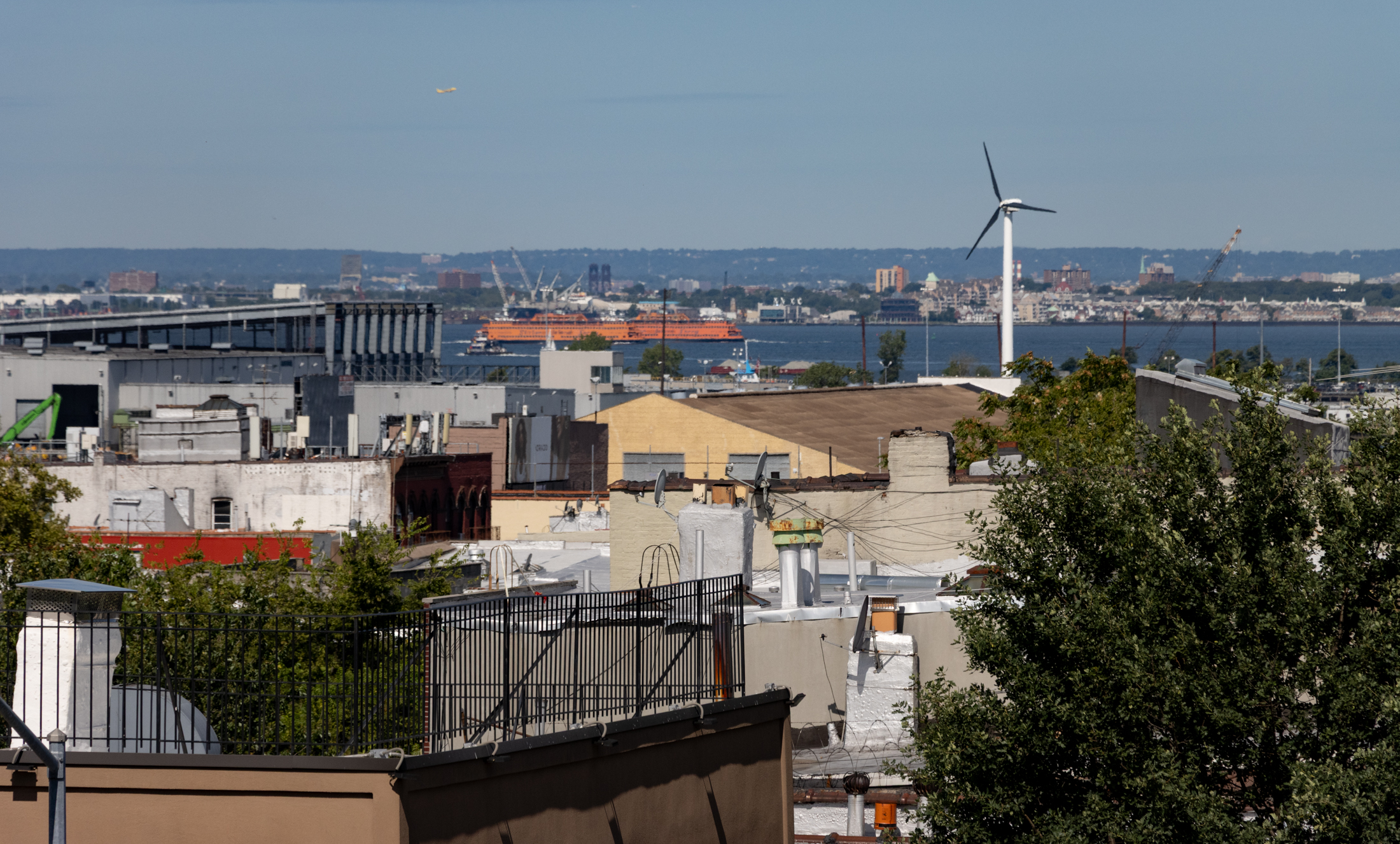Will Retail Continue to Trump Industry in Red Hook?
Roland Lewis, president and chief executive of the Waterfront Alliance, took questions about New York City’s waterfront on the New York Times’ Cityroom blog this weekend, and second up was Red Hook, and the Todd Shipyard, razed to make way for IKEA’s parking lot. He called the loss a “tough blow to the maritime industry…


Roland Lewis, president and chief executive of the Waterfront Alliance, took questions about New York City’s waterfront on the New York Times’ Cityroom blog this weekend, and second up was Red Hook, and the Todd Shipyard, razed to make way for IKEA’s parking lot. He called the loss a “tough blow to the maritime industry in New York,” especially since a study confirmed we need an additional eight ship repair centers to stay in the maritime business. Red Hook’s the perfect spot for such activity, he says, with its deep water, but retail continues to replace industry there. One rumor making the rounds in the neighborhood is that the vacant lots across from IKEA, where once the Revere Sugar Factory stood, are going to be a Sam’s Club. That’s right, Wal-Mart’s stepbrother might be moving in. Anybody else heard such rumblings? Anybody think it’s a little sad that prime waterfront space is being reserved for multinational corporations?
Answers About New York City’s Waterfront [NY Times]
Photo by FrankLynch





All I have to say about this thread is that if someone tries to bring another big box store to the waterfront in Red Hook I and a lot of other people will fight this to the end. The waterfront should not be wasted on big box stores. Waterfront property is extremely limited and valuable. Talk about short sited. Get a clue!!!
What NYC needs, and what would suit Red Hook to a “t” – (except the lack of great mass transit), is a real urban market – like Borough Market in London, or Pike Place Market in Seattle. The waterfront would be a great backdrop. Classic buildings on cobble stone streets. It would employ a significant number of people and would really solidify Brooklyn’s base – economic, social, aesthetics, etc. Just think of Fairway – just infinitely varied, bigger, “real”.
The whole point of this thread (and the asbestos thread the other day) was an opportunity to discuss ideas and possibilities. More importantly, it was a chance to express viewpoints about industry, and the economy, not produce a manifesto. And sure, many of us don’t have the backgrounds you do, although a lot of us have a range of experience and brains you would neither credit nor respect.
If I didn’t want to learn about why manufacturing is or is not feasible, I wouldn’t have posted. Unlike you, I am always aware that anything I post is my only opinion, and I don’t require anyone to agree with it in order to have a civil discussion. But it takes a mature adult to do that and maturity seems not to be your strong suit.
Denton;
You said a mouthful! Prior to moving to sales, I was an engineer for 15 years, specifying products that were manufactured in New Hampshire and Japan. One of the sadder aspects of NYC’s transformation is that many of its residents have lost touch with large parts of the other economic sectors that are in this country, such as farming, manufacturing and mining/exploration. As I said in my original post, this evolution was inevitable, but I find that it has brought an unrealistic worldview to many folks here.
I even see it in the condo where I live. It is a new condo, and I observed how many of my fellow residents interfaced with the builder concerning the inevitable problems that crop up in new construction. Issues that could have been resolved with a modicum of practicality on the residents’ side were immediatly escalated to the threat of legal confrontation. I was even reviled by some residents for the fact that I could get issues resolved by simply applying some common techncial sense to the negotiations.
I am not as pessimistic as you about the US economy. There is no doubt that our manufacturing base has been hit hard in recent years, but I still see alot of areas of strength, and believe that we will do well. For all the gains that China has made over the past few years, it is interesting to note that they have not evolved at all (as the Japanese did). For example, no major Chinese brand name has been planted in the minds of consumers, in the effective way that Sony, Toyota and all did.
Concerning NYC, I think the greatest harm is done by those who hold to the belief that the key to the uplift of folks in the Red Hook projects and elsewhere is through locally-based manufacturing. If folks really wanted them to do well and move into the middle-class, they would tell them that there are realistically only two options:
-if you want to stay in the NYC area, then get a good, advanced education.
-if you want to move into the middle class through manufacturing work, then move the the South or areas like southern Indiana where this is still possible.
My company has a plant in southern Indiana that I occassionally visit. Folks in NYC would be shocked at the wages they are paid. Yet, due to the low cost of living there, they have a comfortable life. Most own a modest, but nice home on a good-sized piece of land, and there is usually a 20-feet boat parked in the yard, for weekend fun.
Good talking with you.
Hey Benson…
without going into the personal stuff, yeah, most people don’t have a clue what goes into ship repair/ship building, and the associated environmental issues.
Before my child was born, and I sought more local employment, I was in the international marine biz and visited shipyards all over the world.
Paint stripping, galvanizing, tank cleaning, cutting, welding, sanding, and disposal of huge amounts of scrap metal, hazardous chemicals, asbestos, lead paint, abrasives, etc. are just a small part of the game.
Hell, just look at the thread on asbestos removal on Smith Street the other day. Plenty of asbestos still on those ships.
Furthermore the US has been so de-industrialized that you can’t even source a lot of steel here anymore. You can’t source a lot of _anything_ here any more. Speaking of articles, I noted a few weeks ago that one of the problems in building new nuke plants here is that some part of the vessel is made by only one company in the world, Japan Steel Works. See the bottom of page 2
http://www.nytimes.com/2007/12/05/business/05nuke.html
I wonder how many USCG-certified welders are left in NYC?
I bet many Brownstoners are familiar with the work of Edward Burtynsky, who documents large-scale industrial processes. Some of his photos of ship-breakers in Bangladesh are on line, see
http://www.cowlesgallery.com/archive/burtynsky/shipbreaking.html
Higher fuel prices may make some manufacturing more feasible in the US, and I like that. But the US is not Red Hook, and Ikea didn’t open a factory in Red Hook, it opened it in Virginia.
Heaven help America if we ever have to fight a real war with a real country. We won’t have the industrial production capability to fight it.
No one laments the demise of manufacturing in both NYC and the USA more than I do, but it ain’t coming back to Red Hook for all the reasons Benson lists and more.
Or telling them to open manufacturing plants in the US, like Ikea did. I read the article too.
anyone notice the article appeared at almost the exact same time the times had another article on the front page about the decline in shipping worldwide due to higher fuel costs? Just sayin…long term vision needed. I think they should allow the big boxes (and negotiate with them as a whole somehow) and strike a deal that they can open the store IF they (as a whole) provide large scale transportation solutions for the area (ferries, light rail, whatever). Thanks for reading!
well in case you haven’t noticed, brownstoner wants comments. It’s not a blog otherwise and since my opinion is the same as anyone elses you are free to not read it. At least I respect other people’s opinions, and believe me there are quite a few I disagree with. Nor do I pontificate on every topic- since you’re too stupid to notice, there are certain topics I am passionate about and I generally stick to them. But you obviously don’t have the comprehension level to begin to understand what I said. And then, who the hell are you to take me to task? You’re a damn salesman, for chrissakes. Or did you think that qualified you to be Albert Einstein?
As for my “utopian” vision- That’s your ultra right wing faux intellectual interpretation based on whatever childhood traumas about communism you seem to have had. If you think you’ve read my “extolling glorious factories” anywhere I beg you to quote me. Other than that, get your hallucinations under control. Take your meds because you couldn’t tell the difference between a utopian vision and a porno movie.
My dad was a garmento. Want to know what sweatshops were like? Believe it when I tell you some of the shops my dad worked in would have thought a factory on the waterfront was heaven. The unions put him out of business and he went bankrupt- want to talk about poor? Don’t you dare tell me what I think or try to even tell me what I will or will not do. You are nowhere near educated or intellectual enough to do that. You don’t like what I write? tough. don’t read it.
Bxgrl;
The reason I am so harsh with you is the way you comport yourself on this blog. You pontificate on every topic that comes along, in accordance to some sort of utopian vision that you have. Give us a break. If the twentieth century demonstrated anything, it demonstrated the fallacy of utopian visions, whether derived from the left or the right. Not every issue can be painted in black and white, as is done by you and others on these pages.
I was born but a stone’s throw from the site of where IKEA and Fairway now stand. My parents worked in one of those glorious factories that you believe were so great. Do you know what the biggest industry in those factories was? Making paper bags. My father as a child attached handles on shopping bags. Would you have him go back to those days? Should I drop what I’m doing and start making paper bags? How about you?
Fortunately for me, my parents improved their lot, and likewise for their children.